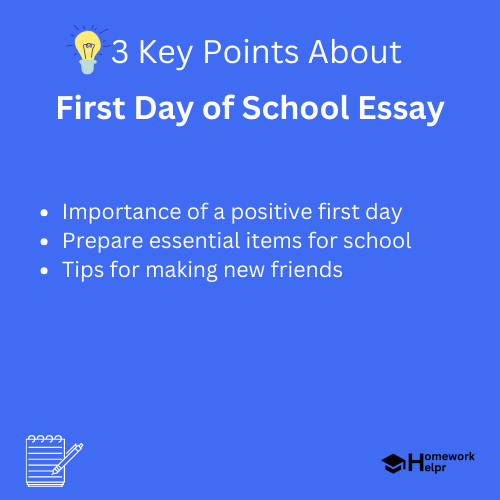📝 Summary
The first day of school is a pivotal moment for students, parents, and teachers, signaling the start of a new academic year filled with learning and friendships. Emotions such as excitement and nervousness are common as students familiarize themselves with their surroundings, classmates, and teachers. This day is crucial as it sets the tone for the entire year and provides an opportunity for students to engage in activities that foster belonging and motivation. With preparation and a positive attitude, students can navigate their fears, make friends, and embark on an enriching journey.
First Day of School: A Journey Begins
The first day of school is often a highly anticipated day for children, parents, and teachers alike. It marks the beginning of a new academic year filled with opportunities for learning, growth, and new friendships. As students step into their classrooms, they experience a mix of emotions—excitement, anxiety, and in some cases, nervousness. This essay will explore the various aspects of the first day of school, what students can expect, and how they can make the most of this important day.
The Importance of the First Day
The first day of school is significant for several reasons. Firstly, it sets the tone for the entire academic year. A positive first day can foster a sense of belonging and motivation among students. Teachers aim to create an inviting atmosphere where students feel comfortable expressing themselves and engaging with their peers. Secondly, it is an opportunity for students to familiarize themselves with their new surroundings, classmates, and teachers.

What to Expect on the First Day
Students can expect a vibrant atmosphere filled with laughter and curiosity. Typically, on the first day of school, the schedule may include activities such as:
- Introduction of teachers and staff
- Getting to know your classmates
- Classroom rules and expectations
- Overview of the curriculum and subjects
Teachers often organize interactive icebreakers to help students become acquainted with one another. These activities are designed to ease the tension that many feel when meeting new people. Additionally, students will receive their timetables, which outlines the subjects they will study throughout the year.
Definition
Icebreakers: Activities designed to help people get to know one another and generate conversation in a relaxed atmosphere.
What to Bring on the First Day
Being prepared for the first day is essential. Here‚’ a list of items students should consider bringing:
- School supplies (notebooks, pens, and pencils)
- Backpack
- Water bottle
- Lunch or snack
- A positive attitude!
Having all the necessary supplies not only enhances the learning experience but also helps students feel more confident. Additionally, many students may want to dress in their favorite outfits to make a good impression. Remember, feeling comfortable and confident can significantly impact one‚’ enthusiasm for the upcoming school year.
Examples
For instance, Emma packed her favorite blue backpack, along with colorful notebooks and new pens. She felt excited to start fresh in a new grade.
Facing One’s Fears
Even though the first day can be thrilling, many students also experience fear or anxiety. Questions like “Will I make new friends?” or “What if I don‚Äôt understand the lessons?” often arise. It’s important to understand that these feelings are normal. Here are some ways students can cope:
- Practice deep breathing before stepping into the classroom.
- Visualize a positive experience.
- Talk to a parent or friend about feelings of anxiety.
- Focus on getting to know one person rather than the entire class at once.
By addressing their fears, students can transition smoothly into the school year with a more positive mindset.
Definition
Anxiety: A feeling of worry, nervousness, or unease about something with an uncertain outcome.
Making Friends
Making new friends is one of the most exciting parts of the first day of school. Whether students are returning to familiar faces or starting in a brand new environment, the potential for friendship is everywhere. Here are some tips for making new friends:
- Be open and approachable.
- Join group activities or extracurricular clubs.
- Initiate conversations by asking questions about shared classes.
- Offer help or support to others, whether it‚’ academic or in making connections.
❓Did You Know?
Did you know that many lifelong friendships start on the first day of school? It’s often the shared experiences and feelings of nervousness that bring kids together!
As students engage with their classmates, they begin to weave a social fabric that will support them throughout the academic year and beyond.
Examples
For example, Jake noticed a student sitting alone during lunch. He introduced himself, and they ended up talking about their favorite video games, forming a friendship in no time.
Conclusion
The first day of school is a wonderful opportunity for personal growth and fresh beginnings. It‚’ a time to embrace new experiences, form lasting friendships, and embark on an exciting academic journey. By being prepared, staying positive, and reaching out to others, students can ensure that their first day is not just a day of starting school but a memorable step toward a successful year. Remember, everyone is in the same boat, and with a little courage, the excitement of new beginnings can turn apprehension into joy!
Related Questions on First Day of School Essay
What should students bring on the first day?
Answer: Students should bring school supplies, a backpack, and a positive attitude.
Why is the first day of school important?
Answer: It sets the tone for the entire academic year.
How can students cope with anxiety on the first day?
Answer: Practice deep breathing and visualize positive experiences.
What are some ways to make new friends?
Answer: Be open, join activities, and initiate conversations.
